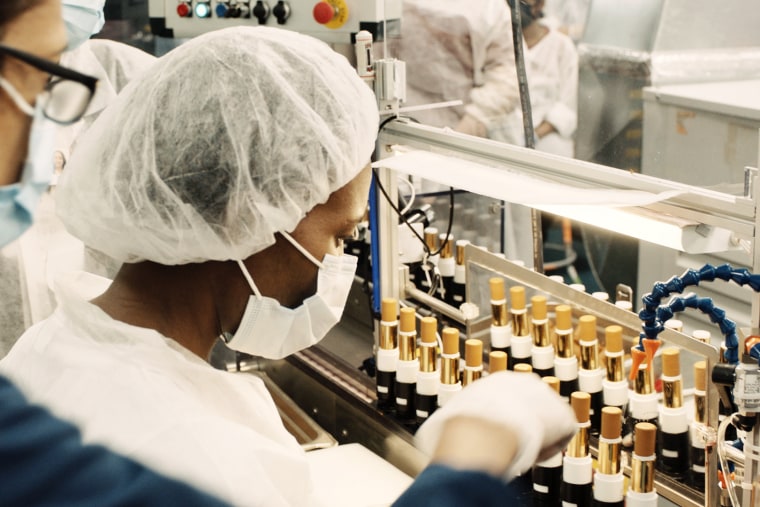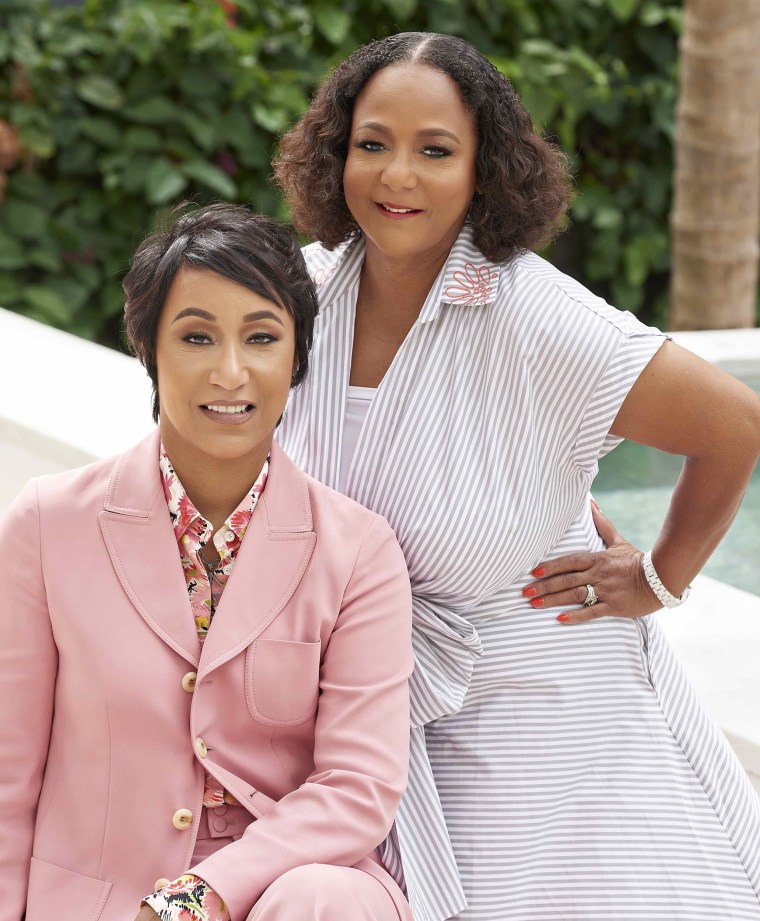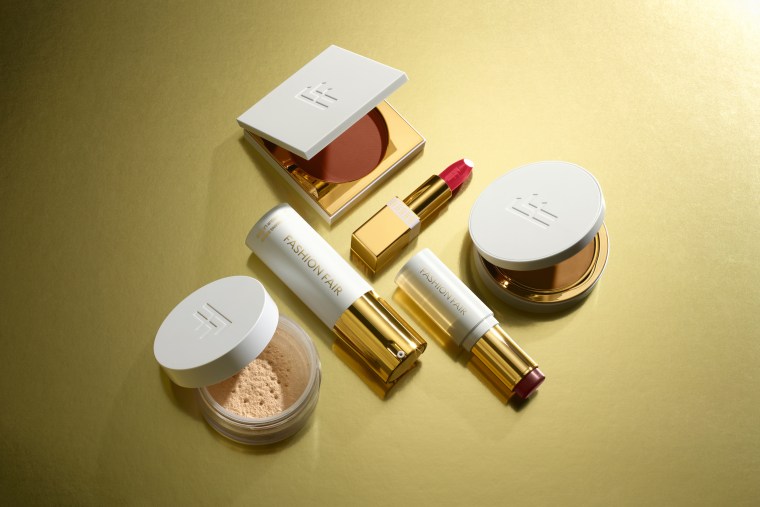In the new documentary “The Natural beauty of Blackness,” Grammy Award-profitable singer and actor Kelly Rowland reveals a hidden battle that afflicted her self esteem onstage: acquiring makeup that matched her complexion.
“It’s so unfortunate, since I remember conversing to other products, like supermodels, who said they had the identical problem,” Rowland reported in the documentary. “They would repair it up themselves — and in this article we are, 20 a long time later on, and they’re figuring it out, however.”
“The Beauty of Blackness,” now accessible on HBO Max, follows the cross-generational journey of Fashion Truthful, a single of the very first Black-owned makeup traces. It follows co-owners Desiree Rogers and Cheryl Mayberry McKissack on their route of acquiring the brand, the troubles they expert alongside the way and the impact Manner Good is making in the Black neighborhood.

When elegance pioneer Eunice Johnson launched her cosmetics line Manner Fair in 1973, she established a new house for Black women of all ages in the market. Johnson — also the spouse of John H. Johnson, the founder of Jet and Ebony magazines — built makeup exclusively for women of all ages of darker skin tones who ended up often unable to obtain merchandise to match their complexion. The corporation became one particular of the initially Black-owned worldwide cosmetic traces and broke racial limitations in small business by celebrating Black elegance.
Trend Reasonable went out of organization for much more than two yrs right before Rogers and McKissack acquired the brand name in October 2019. Right after reaching the peak of its commercial good results in 2003, the organization declined because of to its incapacity to preserve up with the heightened demand from customers and raising competitiveness from other brand names that commenced carrying shades for Black women. The closing of many department retailers where Fashion Fair offered its solutions also contributed to the company’s demise.
Right after discovering that Vogue Good was headed toward bankruptcy courtroom, Rogers and McKissack had been granted ownership of the model just after profitable a bid during an auction.
“I imagine there’s a great entrepreneurial message that in some cases issues are not the way that they really should be, or the approaches that could be, and so we have to get it on ourselves to make those improvements,” McKissack explained to NBC News.

Desiree Rogers and Cheryl Mayberry McKissack.Heather Houston / Courtesy HBO Max
Black ladies typically confront hurdles in the natural beauty market, both in the deficiency of makeup solutions for those with darker skin tones and the lack of representation in who owns the providers.
In 2019, Black customers accounted for pretty much 90 p.c of the income used on ethnic hair and elegance products, according to Nielsen. Still Black possession is not reflective of this outsize influence: Black-owned attractiveness manufacturers characterize only 4 {362bf5cdc35eddfb2532d3c23e83b41deb229c4410d15cb1127c60150cbd4488} of superior-stop make-up income. Even with the 15 P.c Pledge, an initiative encouraging stores to devote at minimum 15 per cent of their shelf room to Black-owned organizations, quite a few continue to absence these goods, McKissack reported.
When Rogers entered the entrepreneurial entire world, she faced hurdles that numerous Black females can relate to: She was section of the initial technology in her spouse and children to go to enterprise school and came from a relatives that was not wealthy. Fueled by her have encounter, she wants to guarantee that there’s a risk-free room for dialogue among the other Black small business leaders concerning issues their firms might face as they improve, she explained.
Black-owned companies have a brief life span, according to 2021 knowledge supplied by McKinsey & Company’s inclusive shopper survey: Only 4 p.c keep in procedure for a tiny more than 3 years, when compared to the 55 p.c typical for all companies. Aspects these as lack of geographical connections to sources, as effectively as a distrust of establishments, had been barriers Black entrepreneurs confronted in having aid for their organizations, according to a 2020 McKinsey report.
“It’s about item improvement,” Rogers claimed. “It is about getting into distribution. It is about launching your product or service. … They are serious organization issues that you want to deal with and talk by way of as you develop.”
In its approximately 50-calendar year record, the makeup model has elevated a lot more than $55 million for the Black community via charity situations. Trend Truthful also designed a scholarship fund for Spelman University learners pursuing a occupation in entrepreneurship. Pupils will also have the chance to participate in an internship — with the goal of giving them equipment to successfully navigate company in the genuine earth.

In November, the corporation initiated “The Artwork of Shade Matching,” a monthlong, nationwide advertising celebration encouraging women to journey to Sephora and obtain their matching basis. At one of the occasions in New Orleans, which highlighted a efficiency by rapper Massive Freedia, McKissack explained she was approached by a Chicago woman who shared how Manner Fair was the only make-up ready to go over her daughter’s birthmark, which aided raise her self-confidence.
McKissack mentioned Style Reasonable not only experienced “great meaning” for the woman, but also for her daughter. “So which is that cross-generational working experience that just just cannot be matched,” she stated.
Whilst brainstorming strategies to achieve shoppers, Rogers said she would question herself, “What would Mrs. Johnson do?”
“It’s definitely significant that we can attractiveness to a cross area of gals of coloration,” McKissack stated, “because we have the exact desires even while we may perhaps like different items.”
Rogers explained that at a single of their activities in Chicago, folks have been brought to tears in excess of the nostalgia the brand name brings — exhibiting how the more mature generations who grew up with the brand name now see their small children and grandchildren employing the solutions.
“They know that we’re going to acquire care of them,” Rogers explained. “You’re not likely to get there and not find your shade, or really feel like, ‘Oh, gosh, this doesn’t glance like me.’ We’re carrying out this with love due to the fact we are you. I assume all people at some stage would like to search superior to by themselves — in conditions of what they’ve preferred and how they are presenting them selves — and it should not be that hard of a process.”
By bringing the brand name back, Rogers and McKissack are incorporating almost 50 years of understanding in the earth of skin treatment.
“For so numerous yrs, we have not been a aspect of the selection-producing procedure,” Rogers reported. “We have not been capable to say, ‘No, we want this and not only do we want it, we’re heading to do it ourselves and get it out there in a important way across the state.’”
